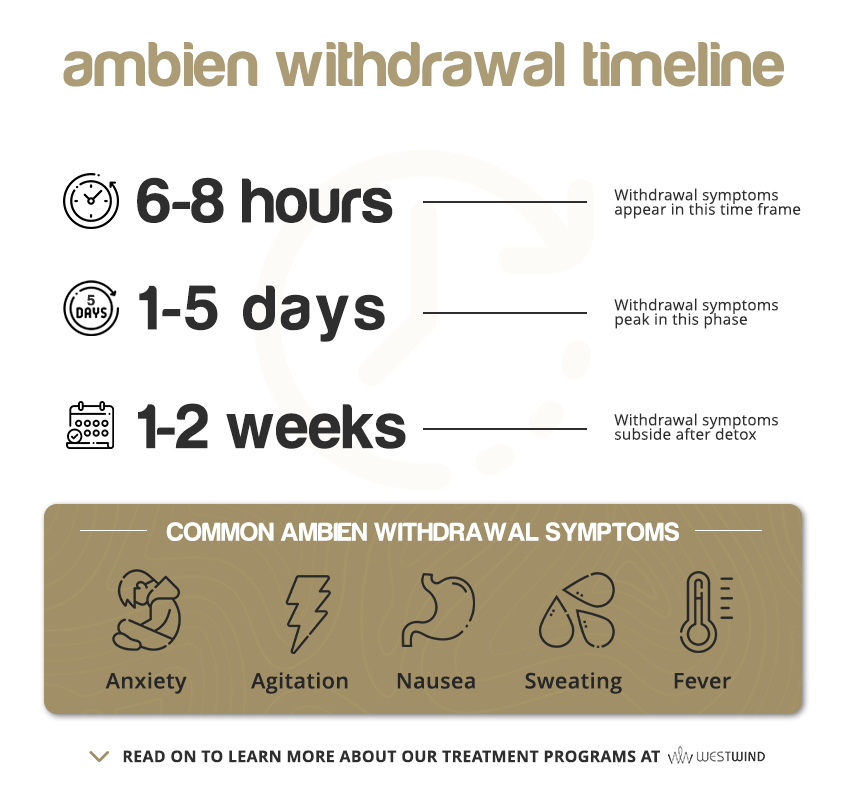One of the worst conditions to be experienced by people today is the disruption of their sleep patterns. This leads to several rest-related problems, the least is insomnia. This is mainly why so many people are dependent on medications that help them sleep.
One such medication is Zolpidem, which is commercially marketed under the brand name Ambien. Ambien belongs to the class of medications known as sedative-hypnotics, which induce a state of rest or sedation by irritability or excitement. This basically slows down brain activity so that a person is able to enter a state of rest.
Unfortunately, Ambien also happens to be quite habit-forming for a lot of people. This is why Ambien addiction is also a major concern for many physicians who need to prescribe to those with sleeping disorders.
What Is Ambien and Why Do People Use It?

The resulting fatigue and cognitive impairment from lack of sleep is also associated with increased health care costs and low or lost work productivity. This condition is also largely connected to people developing chronic conditions where they had none, such as obesity and even depression.
This is why medications that help in treating sleep problems, such as Ambien, are largely used by people with such a disorder. As a sleep disorder treatment, Ambien helps in improving sleep onset, onset latency, and staying asleep. Ambien, however, much like other sedative-hypnotics, should only be used in short-term treatment.
What Are the Side Effects of Using Ambien?
Ambien is a medication that helps people sleep by slowing brain activity. As such, it does come with side effects that are largely associated with sleepiness, feeling deeply relaxed, and a marked slowing of the cognitive functions of the brain, and of the motor functions of the body as well.
There are also other side effects to it, including:
- Drowsiness
- Tiredness
- Headache
- Dizziness
- Lightheadedness
- Nausea
- Impaired balance
- Constipation or diarrhea
- Flatulence
- Dry mouth
- Heartburn
- Palpitations
- Tremors and twitches
- Vivid or unusual dreams
- Pain, burning sensation, or tingling in extremities
- Ringing, pain, or itching in the ears
- Red eyes
- Muscle aches
- Cramps
- Heavy menstrual bleeding (during a female’s period)
- Next-day drowsiness
- Somnambulism
- Short-term memory loss
- Hallucinations
- Impaired coordination
- Suicidal tendencies
There are people who have experienced more severe side effects from taking Ambien apart from what was already mentioned. It is highly advised that should any of the following side effects be experienced, seek medical attention immediately because it could be indicative of a complication or severe allergic reaction.
- Rash
- Hives
- Severe itching
- Swelling of eyes, face, lips, tongue, or throat
- Sensation that the throat is blocked or constricted
- Difficulty breathing and swallowing
- Hoarseness
- Shortness of breath
- Jaundice
- Severe nausea
- Vomiting
- Tachycardia (abnormally elevated heart rate)
- Chest pains
- Blurred vision or vision problems
- Bradycardia (abnormally slow heart rate)
- Loss of consciousness
- Coma
There are also known cases where many people taking Ambien have gone into overdose and have slipped into a coma-like state where they remain unresponsive to efforts to wake them. Even the basic side effects of Ambien use are enough to be a serious risk for many, such as the drowsiness and dizziness that comes with it.
As these side effects are only felt when the person is awake, there is a chance that these could be experienced when they are most dangerous, such as when the person is driving, operating machinery, or requires concentration to accomplish a sensitive task.
What Are the Withdrawal Symptoms of Ambien Dependency?
As with any medication or substance that was abused, people with an Ambien dependency will find out that it also comes with many withdrawal symptoms once they go into detox. The severity and duration of Ambien withdrawal symptoms could depend largely on a few factors, such as:
- Length of use
- Dosage
- Age of person who used Ambien
- Reaction to the pre-existing conditions
- The general level of health during detox
Ambien withdrawal symptoms include:
- Agitation
- Irritability
- Hypertension
- Hyperventilation
- Fever
- Profuse sweating
- Tremors and twitches
- Stomach cramps
- Rebound insomnia
- Nervousness
- Convulsions
- Nausea
- Vomiting
- Uncontrollable crying or emotional outbursts
- Panic attacks
- Anxiety
- Hallucinations
- Delirium
- Chronic fatigue
- Flushing
- Lightheadedness
- Depression
- Mood swings
- Disorientation
- Elevated body temperature
While these withdrawal symptoms do tend to become immensely uncomfortable and burdensome, they are, at least, in no way life-threatening. Other withdrawal symptoms from other medications could become life-threatening. The greatest danger thus far from this medication is death as a complication of overdose or a severe allergic reaction to it.
What Is the Ambien Withdrawal Timeline?
Much like the timeline of other sedative-hypnotics, the withdrawal symptoms could manifest in as little as 6 to 8 hours after the last dose. These symptoms could peak within 1 to 5 days and start to subside after 1 to 2 weeks after detox.
Suggested Ambien Addiction Treatment Programs?
As Ambien directly affects the brain and the nervous system, many of the side effects and symptoms are closely linked to the way a person thinks and behaves. The most effective treatment for Ambien addiction is psychotherapy. Ambien has debilitating side effects. Initially, detox and rehabilitation are performed in a clinical facility where people could give hospital-level care and attention.
Inpatient Treatment
Using Ambien severely affects a person’s ability to stay awake, think clearly, move at a normal pace, and react quickly enough for their own safety. This is why inpatient treatment could be the best option, particularly for those who are still in the detox phase or have just completed it.
There are many withdrawal symptoms that could prevent the patient from functioning well enough on their own, and constant monitoring and assistance could very well be needed for some time.
Outpatient Treatment

A patient who has successfully completed Ambien detox and the initial residential treatment could still be susceptible to cravings and urges to take Ambien once more. Therefore, continued therapy through outpatient treatment could still be needed. With outpatient treatment, patients could still receive needed therapy without having to live within the rehab facility grounds. Patients could go home at the end of the day once their therapy sessions are completed.
Support Groups
While there are many who have successfully overcome their urges to take whatever substance they had a dependency on, others are not as fortunate. The cravings could be something that is still very real for them, attacking them when they are most vulnerable. Therefore, having a support system in place could be quite helpful in these instances.
In the case of Ambien dependence, having a support group where a person could receive assurance, empathy, and advice could go a long way to ensuring they don’t suffer a relapse when the urges are particularly strong.
Cognitive Behavioral Therapy
Substance abuse disorders tend to alter the way people think and behave in everyday life. These thinking and behavioral patterns could either be present constantly or just come out due to a trigger. These are the things that are addressed in cognitive behavioral therapy (CBT).
In many cases, the person is not aware of the alteration of their thinking and behavioral patterns, which is largely attributed to their substance abuse. CBT helps them recognize these things as very real and very damaging to them and to others.
Once a realization has been achieved, CBT could also be used to alter these thinking and behavioral patterns to the following:
- Something that is not destructive
- Does not promote self-harm
- Doesn’t lead them to indulge in using their substances as a reaction to their triggers
Dialectical Behavior Therapy
Dialectical behavior therapy (DBT) is a modified and refined type of cognitive behavioral therapy that seeks to help a person develop coping mechanisms and reactions to specific stressors and triggers. These coping mechanisms are considered safer, more constructive, and less likely to put them in a situation where they would use substances.
Not being able to sleep and rest properly is more than enough to drive a person to desperation, and consequently, an Ambien addiction. DBT teaches a person to seek out alternative solutions to their problems and identify which notions could prove to be harmful or beneficial. This therapy also allows a person to regulate the level of interference of their emotions when they are faced with a stressful situation. Many often find themselves in trouble because of the knee-jerk reaction caused by their emotions, and this is regulated by DBT.
Ambien Addiction Treatment at Westwind Recovery® Los Angeles, CA
For many, sleep and rest are the only rewards they look forward to at the end of a stressful day. Should these things be denied, individuals are sure to resort to other measures to get the much-needed rest, such as sleeping aids. This, of course, leads to dependency, such as Ambien addiction.
We know this only too well, but we also know how to help individuals who suffer from dependency. We know these things because we have helped many back to recovery from it. Let us help you as well.

Dr. Deena is the Chief Clinical Officer of Westwind Recovery®, an award-winning outpatient treatment center in Los Angeles where she oversees the clinical and administrative program and treatment methods. Dr. Deena is a doctor of psychology and licensed clinical social worker since 1993. LCSW #20628. Originally from the East Coast, Dr. Deena has worked running treatment centers, worked as a therapist in psychiatric hospitals as well as school settings and currently has a thriving private practice in the LA area. Dr. Deena has appeared regularly on the Dr. Phil Show as an expert since 2003. She has also been featured on many other TV shows, podcasts and has contributed to written publications as well as podcasts.







